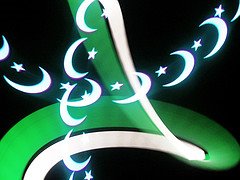
The News, August 14, 2006
Marching towards the Quaid’s dream
Feuilleton
Prof Khwaja Masud
Fifty-nine years ago, Quaid-e-Azam unfurled the banner of freedom for the teeming millions of Pakistanis. I was twenty-five then and I look back to that historic day with pride. But, we look at the flag that has been torn asunder, and I cry with Byron:
Yet, freedom, yet thy banner torn but flying,
Streams like a thunderstorm against the wind.
We look around and find ‘shape without form, shade without colour, paralysed force, gesture without motion’. Most disheartening is the fact that “the best lack all conviction, while the worst are full of passionate intensity.”
Nevertheless, we look forward to the future with hope. We are reminded of the verse of Faiz:
It does not matter if we have not witnessed, others won enjoy
The blossoming of the garden and sweet song of the nightingale.
Freedom, after all according to Spinoza, is the recognition of necessity. As the great Italian revolutionary, Antonio Gramsci has put it, “I never had any illusions and I have never been disillusioned. I am a pessimist intellectually, but an optimist from the point of view of will. It seems to me that all life is a struggle to dominate our surroundings, and not to be crushed by them. To beat one’s head against the wall is to break one’s head and not the wall.”
We must all unite to pull down the rotten wall of the feudal and the nouveau riche, their chicanery and ruthless exploitation to throw the avenues open for the onward march.
As Iqbal has made it clear in his sixth lecture on “The principle of movement in the structure of Islam” that “the essence of tauheed as a working idea is freedom, solidarity and equality”. He goes on to say: “The state, from the Islamic standpoint, is an endeavour to transform these ideal principles into space-time force, an aspiration to realise them in a definite human organisation.”
Quaid-e-Azam grasped the essence of tauheed and translated one aspect of it is freedom into reality. In his inaugural speech on August 11, 1947, he laid the foundation for the second aspect of tauheed i.e. solidarity. He elaborated the concept of a Pakistani nation who would decide all political issues without treading upon the religious beliefs of any community. He did not have time to elaborate the third aspect of tauheed i.e. equality. But in his Chittagong speech he made it clear that Pakistan would pursue egalitarian policy in the interest of the downtrodden masses.
Alas! we have forgotten the historic speech of August 1947 and we have done our best to distort it. We had to pay dearly for throwing overboard what the Father of the Nation had told us in his speech of August 11, 1947.
In the same lecture, Iqbal says: “For the present every Muslim nation must sink into her deeper self, temporarily focus her vision on herself alone, until all are strong and powerful to form a driving family of republics.” This is a clarion call to all the Muslim nations to discover their own identity and emphasise it so that each one of them should have patriotic fervour for its own country, its history and its culture to enable it to transform itself into a well-knit, cohesive, united polity. The problems of Pakistan are the same that they had to face during Risorgimento (movement in the mid-nineteenth century to unite Italy and solve her social problems). The great Italian statesman, Cavour said: “We have made Italy. Now we shall make Italians.” That is precisely what we need to do. We have made Pakistan but have we made ourselves Pakistanis? It is no easy task.
To carry it out, we must bring about Reformation and Renaissance — the two great movements that have transformed a medieval Europe into modern Europe. Iqbal correctly gauged: “We are today passing through a period similar to that of protestant Revolution in Europe.” He made strong plea that “each generation guided but unhampered by the work of its predecessors should be permitted to solve its own problems.” Iqbal bemoaned: “The Muslim countries are mechanically repeating old values.” He makes a clarion call: “Open your eyes and behold the sun rising from the east.”
Sarojini Naidu, writing about Quaid-e-Azam, speaks about his many enduring and endearing qualities, but picks out “his shy and splendid idealism” as the most outstanding.
This shy and splendid idealism is the crying need of our nation, which has been sinking into the quagmire of hypocrisy, opportunism and corruption.
The Quaid was fond of recommending Morley’s book “On compromise”, because it emphasises “the importance of self-assertion, tenacity and positiveness of principle.”
Most of us are paralysed by a corrosive sense of disillusionment, futility and dismay. I cannot but quote Robert Kennedy who “warned against the belief that there is nothing one man or one woman can do against the enormous array of the world’s ill against misery and ignorance, injustice and violence. Few will have the greatness to bend history itself, but each one of us can work to change a small portion of events and in the total of all these will be written the history of our nation. Each time a man stands up for an ideal or acts to improve the lot of others or strikes out against injustice, he sends forth a ripple of hope; and crossing from a million of different centres of energy and daring these ripples build a current that can sweep down the mightiest wall of oppression and injustice.”
We must continue to march intoxicated with the Quaid’s “shy and splendid idealism” till we realise the dream of Pakistan as visualised by Quaid-e-Azam i.e. democracy, social justice, tolerance, open mind and heart.
4 comments:
Happy Independence Day!
Happy independance day to all Pakistani and Indian people! :)
Happy Independence Day!
Happy Independence day - interesting site you have here!
Post a Comment